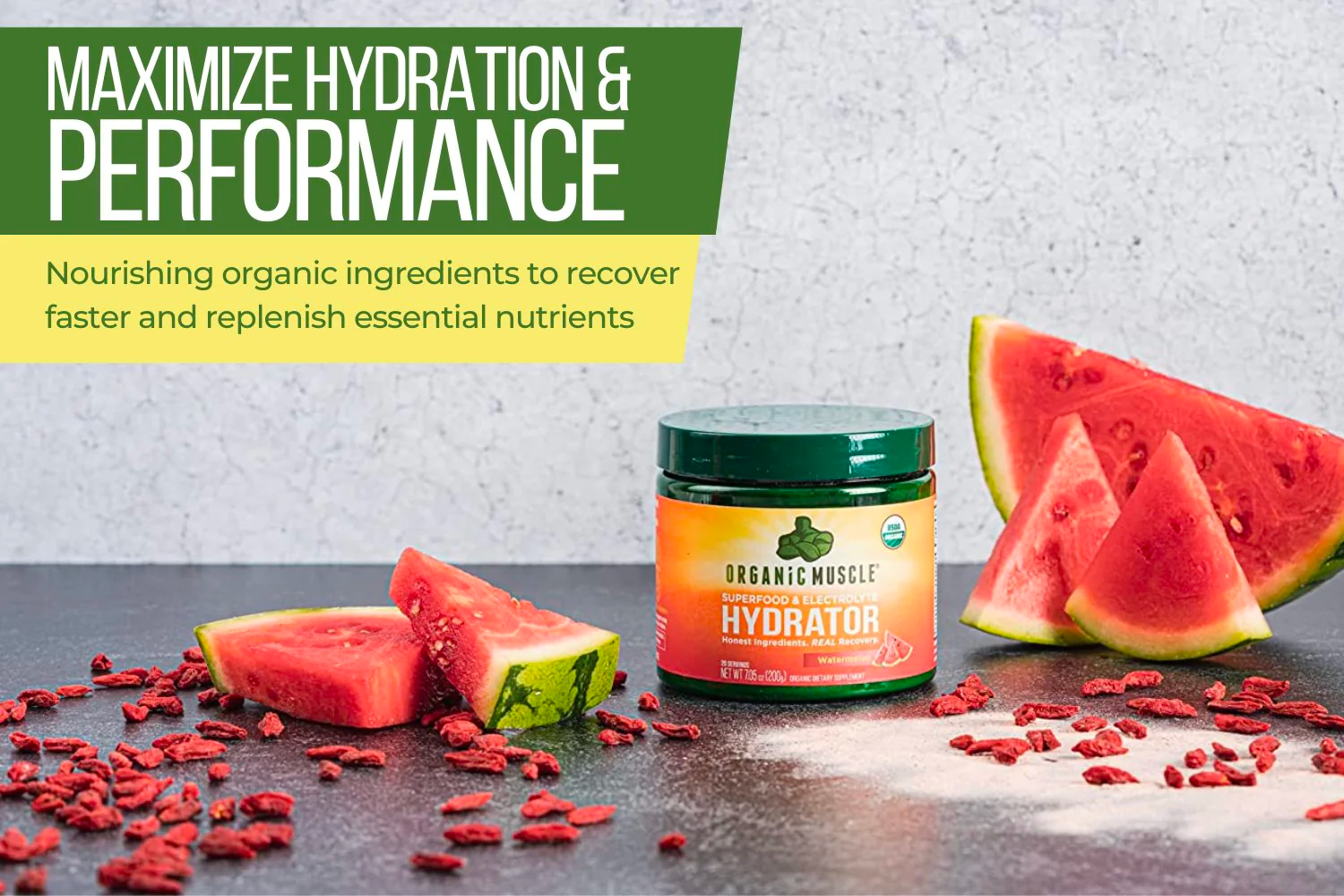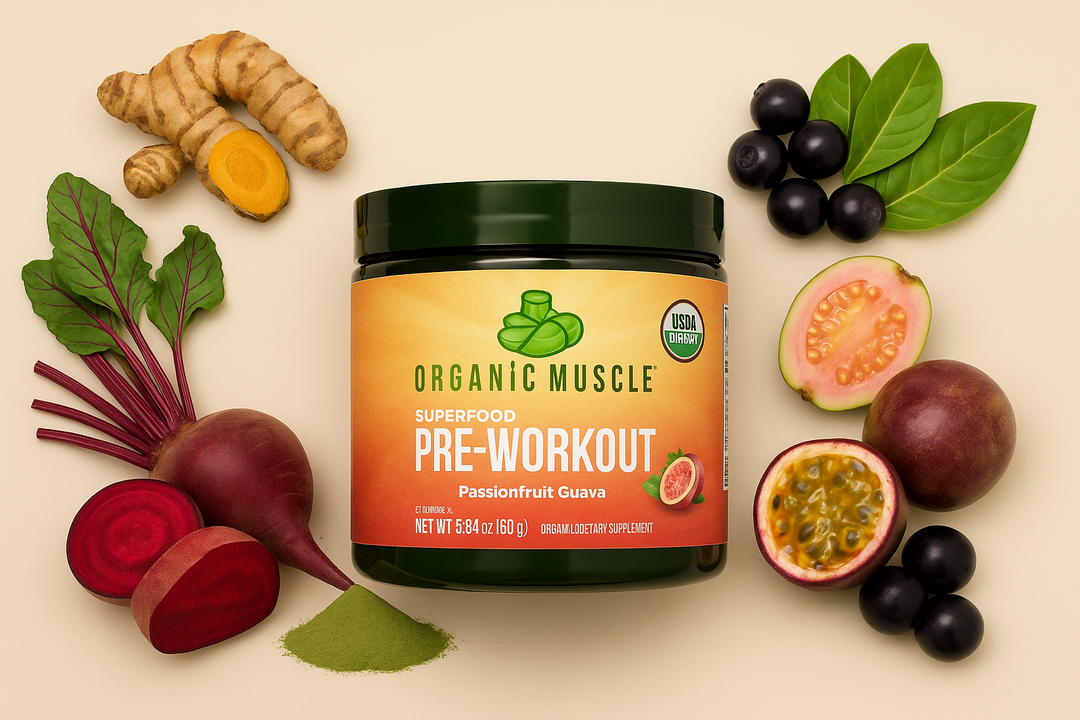In a world where synthetic supplements dominate the market, it's refreshing to know that there are natural alternatives that not only provide the electrolytes your body needs but also nourish you from the inside out. With our commitment to certified organic, non-GMO, vegan, and gluten-free products, we ensure that every sip or gulp of our natural electrolytes is a step towards holistic wellness and fitness.
Whether you're a dedicated athlete, a health-conscious individual, or simply someone looking to boost their daily hydration routine, natural electrolytes are the key to unlocking a healthier, more vibrant you.
To conquer fatigue, banish dehydration, and accelerate recovery – try our Organic Muscle Electrolyte Hydrator. With 16 organic superfoods and natural electrolytes and:
- 30 cal per serving
- No added sugar
- Accelerate recovery
- Quench thirst
- Before, after & during workout
Why Your Body Needs Electrolytes
Electrolytes, including minerals like sodium, potassium, calcium, and magnesium, are crucial for body functions such as nerve and muscle operation, blood pH balance, hydration, and cellular function. They are lost through sweat and other bodily processes, so replenishing them is key to preventing dehydration, cramps, and fatigue.
Natural sources of electrolytes, such as coconut water, sea salt, fruits, and vegetables, offer a healthier alternative to artificial additives, providing necessary minerals without excess sugar. Coconut water is an excellent hydration choice with key electrolytes, while sea salt offers sodium and trace minerals. Bananas and leafy greens like spinach and kale are also beneficial, supplying potassium and magnesium, respectively. Incorporating these natural sources into your diet supports hydration, energy, and overall health, promoting a balanced and additive-free lifestyle.
The Science Behind Natural vs. Synthetic Electrolytes
When it comes to replenishing electrolytes, the source matters more than you might think. Let's dive into the science behind natural and synthetic electrolytes to understand why opting for natural options can be a game-changer for your fitness and overall well-being.
Natural Electrolytes
Natural electrolytes are sourced from whole foods and plants, making them rich in essential minerals like potassium, magnesium, calcium, and sodium. These minerals play crucial roles in maintaining proper hydration, supporting muscle function, and regulating nerve impulses. When you consume natural electrolytes, your body can easily recognize and utilize these nutrients in their most bioavailable form, ensuring optimal absorption and effectiveness.
One prime example of a natural electrolyte powerhouse is coconut water. Packed with potassium, magnesium, and calcium, coconut water serves as a refreshing way to rehydrate after a tough workout. Its natural composition closely mimics the electrolyte balance found in our bodies, making it an ideal choice for those looking to replenish post-exercise.
Synthetic Electrolytes
On the flip side, synthetic electrolytes are often chemically produced and lack the beneficial nutrients found in natural sources. While synthetic electrolyte drinks can provide a quick fix for dehydration, they may contain artificial colors, flavors, and sweeteners that offer little to no nutritional value.
Moreover, synthetic electrolytes may not be as easily absorbed by the body as their natural counterparts, leading to potential imbalances and reduced effectiveness in supporting hydration and performance. Opting for synthetic options may also introduce unnecessary chemicals and additives into your system, which could be detrimental to your health in the long run.
Top Natural Sources of Electrolytes
If you're looking to recharge naturally and maintain optimal performance during your workouts, incorporating foods rich in natural electrolytes into your diet is the way to go. Here are some of the top sources to help you stay hydrated and energized:
Coconut Water
Known as nature's sports drink, coconut water is a fantastic source of electrolytes, including potassium, sodium, and magnesium. It's low in calories, refreshing, and perfect for replenishing lost fluids after a tough workout.
Leafy Greens
Dark leafy greens such as spinach, kale, and Swiss chard are packed with minerals like potassium, calcium, and magnesium. These veggies not only provide essential electrolytes but also offer other health benefits like antioxidants and fiber.
Bananas
Bananas are a convenient and portable snack that is rich in potassium, a key electrolyte that aids muscle function and hydration. They are great to consume before or after exercise to prevent cramps and fatigue.
Avocados
Avocados are not only delicious but also a good source of electrolytes like potassium and magnesium. Whether sliced in your salad or mashed into guacamole, avocados can help replenish your electrolyte levels.
Watermelon
This juicy fruit is not only a tasty summer treat but also a natural source of hydration and electrolytes. With high water content and minerals like potassium, watermelon is a great way to rehydrate after a sweaty workout.
By incorporating these natural electrolyte-rich foods into your diet, you can fuel your body with the essential minerals it needs to perform at its best. Stay hydrated, stay energized, and recharge naturally with these nutritious options.
The Role of Fruits and Vegetables in Electrolyte Balance
When it comes to maintaining optimal electrolyte balance, incorporating a variety of fruits and vegetables into your diet is key. These natural treasures are rich in essential minerals such as potassium, magnesium, calcium, and sodium, which play a crucial role in hydration and muscle function.
Potassium: Bananas are a renowned source of potassium, a mineral that helps regulate fluid balance, muscle contractions, and nerve signals in the body. By including bananas in your diet, you can replenish this essential electrolyte lost during workouts and daily activities.
Magnesium: Leafy greens like spinach and kale are packed with magnesium, a vital electrolyte that supports energy production, muscle function, and nerve health. Including these nutrient-dense vegetables in your meals can help prevent muscle cramps and promote overall electrolyte balance.
Calcium: Dairy products, sesame seeds, and leafy greens are excellent sources of calcium, an electrolyte essential for bone health, muscle contractions, and nerve transmission. Ensuring an adequate intake of calcium-rich foods can contribute to maintaining proper electrolyte levels in the body.
Sodium: While it's crucial to consume sodium in moderation, natural sources like celery, beets, and sea salt can provide this electrolyte that helps regulate fluid balance, nerve function, and muscle contractions. Opting for these unprocessed sources of sodium can support electrolyte balance without the excess found in processed foods.

The Impact of Hydration on Electrolyte Balance
Hydration is crucial for maintaining electrolyte balance in the body, as electrolytes like sodium, potassium, calcium, and magnesium play key roles in muscle function, nerve signaling, and fluid balance. Water alone may not suffice to replenish these essential minerals lost through sweat during physical activities, making it important to consume electrolyte-rich foods or drinks to prevent dehydration and ensure health and performance.
Natural sources such as bananas, coconut water, leafy greens, yogurt, nuts, seeds, and whole grains are excellent for maintaining electrolyte levels. Additionally, natural electrolyte beverages containing sea salt, fruit juices, and coconut water can help restore lost electrolytes without artificial additives or excess sugar. Maintaining proper hydration and electrolyte balance is essential for avoiding muscle cramps, fatigue, dizziness, and more serious health issues, thereby supporting overall well-being and peak physical performance.
Myths and Facts About Natural Electrolytes
Let’s dive into some common myths and facts surrounding natural electrolytes to shed some light on these essential minerals.
Myth: Natural electrolytes are only needed for intense workouts
Fact: While it’s true that vigorous exercise can lead to significant electrolyte depletion through sweating, the need for these minerals extends beyond the gym. Electrolytes play a crucial role in maintaining hydration, supporting nerve function, regulating muscle contractions, and promoting overall body balance.
Myth: Only sports drinks can provide effective electrolyte replenishment
Fact: While sports drinks are a popular choice for electrolyte replenishment, they often come with added sugars, artificial colors, and preservatives. Natural sources of electrolytes, such as coconut water, fruits like bananas and oranges, leafy greens, and nuts, offer a healthier alternative without any unnecessary additives.
Myth: All electrolytes are created equal
Fact: Not all electrolytes are the same. Natural electrolytes sourced from whole foods contain a spectrum of minerals, including potassium, magnesium, calcium, and sodium, each with its unique benefits for the body. Opting for natural sources ensures you get a diverse range of essential nutrients that work synergistically to support your health and fitness goals.
Myth: Consuming too many electrolytes is harmless
Fact: While electrolytes are essential for numerous bodily functions, consuming excessive amounts can lead to imbalances and potentially harmful health effects. It’s essential to strike a balance and consume natural electrolytes in moderation to avoid any adverse outcomes.
By dispelling these myths and embracing the facts about natural electrolytes, you can make informed choices to support your overall well-being and fitness journey.
Creating a Balanced Electrolyte Plan
Maintaining optimal performance and hydration requires a balanced electrolyte plan, focusing on minerals like potassium, magnesium, calcium, and sodium, crucial for muscle function, nerve signaling, and fluid balance. Instead of relying solely on market electrolyte products, integrating natural sources into your routine offers a healthier approach.
Foods such as bananas, leafy greens, nuts, seeds, and avocados are rich in potassium. Magnesium, which supports energy and muscle recovery, can be found in nuts, seeds, and whole grains. Calcium, vital for bones and muscles, is present in dairy, tofu, and greens, while natural sodium sources include celery, pickles, and olives.
Enhancing hydration with water infused with lemon, cucumber, and sea salt provides a natural, preservative-free way to replenish essential minerals during workouts or daily activities, offering a wholesome alternative to artificial sports drinks.
How Do You Fix Electrolyte Imbalance?
Electrolyte imbalances can lead to symptoms like muscle cramps, fatigue, irregular heartbeat, and weakness. Natural electrolytes, easily incorporated into your routine, can help address these issues. Coconut water is an excellent choice for hydration and replenishing electrolytes such as potassium, sodium, and magnesium, while being low in calories and sugar. Bananas, rich in potassium, are versatile and beneficial for preventing muscle cramps.Adding sea salt to meals can replenish sodium, magnesium, and calcium, essential for fluid balance and muscle function, though it's important to monitor intake. Incorporating these natural sources into your diet can help maintain electrolyte balance, ensuring your body remains energized and healthy.
Final Thoughts
When it comes to selecting the right electrolyte sources, it's essential to choose products that align with your values and health goals. At Organic Muscle, we understand the importance of transparency, purity, and quality in the supplements we offer. Our commitment to providing Certified Organic, Non-GMO, Vegan, and Gluten-Free products ensures that you receive only the best ingredients to support your fitness journey and holistic wellness.
Whether you're an avid athlete, a dedicated yogi, or simply someone looking to enhance their overall health and vitality, natural electrolytes can be a game-changer in your quest for optimal well-being. Recharge naturally with the power of electrolytes sourced from nature, and feel the difference in your energy levels, recovery, and performance.
Join us in embracing the power of natural electrolytes and discover the transformative benefits they can bring to your fitness and wellness routine. With Organic Muscle, you're not just nourishing your body – you're nourishing your soul with the pure essence of nature's finest offerings.
Read More:
- Decoding Health Food Labels: Unmasking Hidden Ingredients For Informed Eating
- Navigating The Mind: The Intricate Psychology Behind Diet Trends
- Elevating Your Life: A Comprehensive Exploration Of Biohacking And Human Enhancement For Optimal Health And Wellness
Frequently Asked Questions
What are natural electrolytes?
Natural electrolytes are minerals like potassium, sodium, calcium, and magnesium that help regulate the balance of fluids in the body, transmit nerve signals, and support muscle function.
Why are natural electrolytes important for the body?
Natural electrolytes play a crucial role in maintaining proper hydration, supporting muscle contractions, nerve function, and overall body balance.
How do natural electrolytes compare to synthetic ones?
Natural electrolytes are preferred as they come from whole food sources, providing a more bioavailable form for the body to absorb compared to synthetic alternatives.
What are the best sources of natural electrolytes?
Sources of natural electrolytes include fruits like bananas and oranges, vegetables like spinach and sweet potatoes, nuts, seeds, and coconut water.
Can you get enough electrolytes from diet alone?
While a balanced diet rich in fruits and vegetables can provide natural electrolytes, athletes and those with high activity levels may benefit from additional electrolyte support.
How do natural electrolytes help with hydration?
Natural electrolytes help the body maintain fluid balance, ensuring proper hydration and preventing dehydration during physical activity.
Are there signs of electrolyte imbalance to watch for?
Signs of electrolyte imbalance include muscle cramps, fatigue, irregular heartbeat, weakness, and confusion.
How can electrolyte imbalance affect physical performance?
Electrolyte imbalance can lead to decreased muscle function, fatigue, and cramping, impacting overall physical performance during exercise.
What role do natural electrolytes play in m
uscle function?
Natural electrolytes help muscles contract and relax properly, supporting optimal muscle function and preventing cramps and fatigue.
Can natural electrolytes improve recovery after exercise?
Natural electrolytes aid in replenishing lost minerals during exercise, promoting faster recovery and reducing muscle soreness post-workout.
|
Disclaimer: Organic Muscle products are not intended to treat, diagnose, mitigate, prevent, or cure disease. Organic Muscle products should not replace prescribed medications or the variety of foods important to a healthful diet. |












